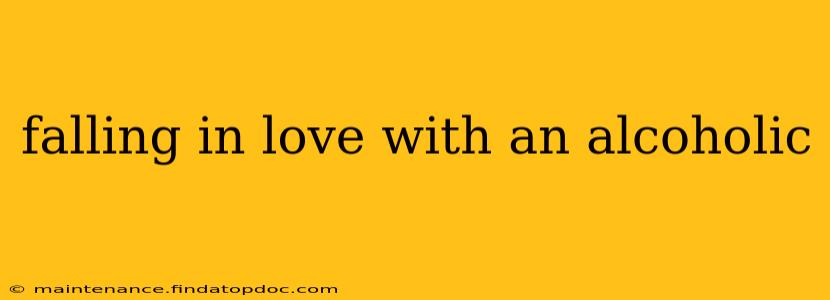Falling in love is exhilarating, a whirlwind of emotions that can feel both magical and terrifying. But what happens when the object of your affection struggles with alcoholism? This situation presents a unique set of challenges, requiring understanding, compassion, and a realistic assessment of the relationship's potential. This article explores the complexities of loving someone with alcoholism, offering guidance and insights into navigating this difficult terrain.
Is it Love or Co-dependency?
This is a crucial question to ask yourself early on. While genuine love exists, it's easy to confuse caring for someone with alcoholism with co-dependency. Co-dependency involves enabling behaviors, where you prioritize the alcoholic's needs above your own, often at the expense of your well-being. This can manifest in making excuses for their behavior, covering up their drinking, or constantly rescuing them from the consequences of their actions. Recognizing the difference between love and co-dependency is the first step toward healthy engagement.
What are the Signs of Alcoholism?
Recognizing the signs of alcoholism is essential for understanding the depth of the issue. These signs can range from excessive drinking and withdrawal symptoms to significant relationship problems and neglecting responsibilities. It's important to remember that alcoholism is a disease, not a character flaw, and recognizing this distinction can foster empathy. Observing consistent patterns, such as increased tolerance, failed attempts at cutting back, and significant negative consequences related to drinking, are key indicators.
How Can I Help Someone with Alcoholism?
You cannot make someone stop drinking. This is a crucial point. While your love and support are vital, you cannot single-handedly cure alcoholism. The path to recovery requires the alcoholic's own commitment and professional help. You can, however, encourage them to seek professional help, attend support groups like Al-Anon (for family and friends of alcoholics) and offer unwavering support, but within healthy boundaries.
What are the Common Challenges in Relationships with Alcoholics?
Relationships with alcoholics often involve a rollercoaster of highs and lows. Periods of sobriety can feel incredibly rewarding, fostering closeness and intimacy. However, these periods are frequently interrupted by relapses, leading to disappointment, hurt, and betrayal. Communication breakdowns are common, as alcohol distorts judgment and impacts emotional regulation. This can lead to arguments, mistrust, and a feeling of emotional instability for the partner.
How Can I Protect Myself in This Relationship?
Prioritizing your own well-being is paramount. Setting boundaries is crucial; these boundaries might involve refusing to cover up their drinking, refusing to loan them money, or even temporarily distancing yourself to protect your emotional health. Remember, your needs are equally important. Seeking therapy, joining support groups like Al-Anon, and building a strong support network outside the relationship will provide the resources you need to navigate this complex situation.
Can a Relationship with an Alcoholic Succeed?
While challenging, successful relationships with alcoholics are possible, but only if the alcoholic is actively engaged in recovery. This requires commitment to treatment, attending support groups, and a willingness to make significant life changes. Sustained sobriety is crucial, and even then, the relationship will require ongoing work, patience, and understanding. It's crucial to remember that your happiness and well-being shouldn't be contingent on someone else's recovery.
What Resources Are Available for Me and My Partner?
Numerous resources are available to both the alcoholic and their partner. These include Alcoholics Anonymous (AA) for the alcoholic, Al-Anon and Alateen (for teenagers) for family and friends, and professional therapy for both individuals. Online resources and helplines can also provide vital support and information. Remember, seeking help is a sign of strength, not weakness.
This journey demands resilience, understanding, and a commitment to self-preservation. While love can be a powerful force, it shouldn't come at the expense of your own well-being. Prioritize your health and seek support – you deserve it.
